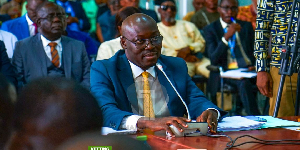Ishmael Mensah Blog of Monday, 13 January 2025
Source: Ishmael Mensah
The Finance Minister-designate vows that we will bring inflation back to single digits.

President Mahama’s nominee for Finance Minister, Dr. Cassiel Ato Forson, has pledged to reduce Ghana’s inflation to single digits through robust fiscal measures, particularly by controlling government expenditure.
Speaking during his vetting on January 13, Dr. Forson outlined a series of proposals aimed at stabilizing the economy, including cutting unnecessary spending and reducing the country’s reliance on borrowing.
One of his key priorities, he stated, is to bring inflation down to a target range of 8%.
"I think we can reduce inflation to 8% plus or minus two if we implement significant reforms, especially on the expenditure side. By doing this, we will be able to shift away from our excessive dependence on the treasury bill market and reopen the domestic bond market," Ato Forson stated.
Along with maintaining fiscal restraint, the Finance Minister-designate pledged to boost economic confidence.
It is necessary for you to go within if you find yourself in a circumstance where you lack funding. Instead of acting as though there is money for us, let's deal with our expenses and reduce them. We can do it here, just as it has been done elsewhere," he added.
Reducing unnecessary expenditures
He would also concentrate on cutting back on unnecessary government spending. "My suggestion is that we examine the spending side as well; borrowing shouldn't be the only option.
It's time for us to reduce waste, so I will take the lead in this process and will require the honorable members to do so in order for us to live within our means.
Ghana would work with its development partners, such as the African Development Bank, the World Bank, the European Union, and other bilateral agencies, as well as the International Monetary Fund (IMF) if necessary to access less expensive sources of financing, Ato Forson said, in order to further address the country's fiscal challenges.
“If there is the need, we will work with our development partners to raise cheaper sources of financing to finance government expenditure, particularly expenditures that can lead to proper and inclusive growth,” Forson concluded.














